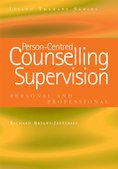Richard Bryant-Jefferies
Counselling, Psychotherapy and Coaching Author, Consultant in Equalities and Diversity, Counselling and Self-Awareness Trainer
PERSON- CENTRED COUNSELLING SUPERVISION: PERSONAL AND PROFESSIONAL
a person-centred dialogue
Richard Bryant-Jefferies
ISBN 1 85775 704 1
Each book in the Living Therapy series provides a demonstration of the appliation of the person-centrd approach to counselling and psychotherapy to clients presenting with particular issues. To complement these, this book focuses more specifically on the supervisory element of the therapeutic process.
Counsellor's, psychotherapists, psychologists and all health and social care professionals need to understand and appreciate the role of supervision in ensuring that practitioners (and not just of therapists) plays in ensuring that clients receive the best possible help and support. This book brings together examples of supervision sessions from the Living Therapy titles, and presents each one as an example of person-centred supervisory practice of person-centred counselling. The supervision sessions deal with a range of issues that arise when working with clients who are seeking counselling in order to respolve difficulties from a wide range of difficult human experiences. Themes include supervising work with clients with drinking problems, drug problems, sexual abuse, disability, mental illness, cultural difference, young people, time-limited counselling.
Each supervision session is introduced with a summary of the background, and points for discussion are included at the end ofeach chapter to stimulate further thought and debate. The book does not seek to demonstrate a definitive way to apply person-centred principles to supervision, but does demonstrate core principles. It will prove valuable to experienced and novice supervisors, and to those uncertain about supervising counsellors working in areas outaside their own professional experience. It should also be read by counsellors in training who are preparing to be supervised, for whom the book offers insights into this collaborative process.
'I am happy that Richard places so much importance on [the] element of relationship in this book, and that it is apparent in every chapter. It is essential that Person-Centred counsellors are offered the core conditions themselves, and a trust in their own experiencing of their therapeutic relationships with their clients, a reinforcing of the supervisee’s internal locus of evaluation, and the encouragement of the development of a reflective “self supervisor”. Richard explores the implications of Person-Centred Counsellors having to undergo supervision from other schools of therapy, where the element of collaboration is not at the forefront.
The succinct synopsis of the theory behind Person-Centred Counselling and the Personality Theory provides a useful backdrop for the scenarios presented in the chapters, and not only does Richard succeed in his aim “of bringing the experience of supervision alive for the reader”, he also manages to relate the theory to practice throughout in a lively, and sometimes provocative manner.
Most of the time, I found myself reading this book as a trainer in Person-Centred Supervision, and would find it useful training material. I agree with Richard that trainees in Person-Centred Counselling Training courses could well find it helpful and reassuring when having to find their first supervisor and embark on the daunting exercise of supervision. The important element in Person-Centred, (or Supervisee-Centred) of non-directectiveness is stressed throughout. It is not the intention of Person-Centred supervisors to tell their supervisees how they should be doing it, or even that they are doing it wrong. Often it is about facilitating the supervisee to know what they know. However, the question of ethics and boundaries is not avoided, and is often discussed under the heading of congruence (both in the supervisor and supervisee).
This publication, as the author states, is timely. I am concerned in my own supervisory practice, often of supervisors, to hear of misunderstandings about Person-Centred supervision. (As indeed there are many misunderstandings about the approach itself). Issues arising in trainee placements, such as assessment, boundaries, challenge, confrontation, etc. etc. are constantly being raised, and the fact that we might deal differently with these issues in the context of Person-Centred supervision than in other approaches sometimes causes problems for volunteer coordinators and/or group supervisors among others. It could be helpful for professionals from other approaches to read this book, to help them understand (and possibly appreciate) our differences.'
Irene Fairhurst, co-founder British Association for the Person-Centred Approach (BAPCA) and the Institute for Person-Centred Learning (IPCL).
Purchase direct from the author (see contact details), from the publisher - Routledge, or all on-line booksellers.
Books published
Counselling the Person Beyond the Alcohol Problem
Living Therapy series
Problem Drinking
Couselling for Problem Gambling
Counselling for Eating Disorders in Women
Counselling for Eating Disorders in Men
Counselling Young People
Relationship Counselling: Sons and their Mothers
Responding to a Serious Mental Health Problem
Counselling for Progressive Disability
Counselling a Recovering Drug User
Counselling a Survivor of Childood Sexual Abuse
Counselling Victions of Warfare
Counselling for Obesity
Counselling Young Binge Drinkers
Counselling for Death and Dying
Time-limited Therapy in Primary Care
Workplace Counselling in the NHS
Person-centred Counselling Supervision
Models of Care for Drug Service Provision
A Little Book of Therapy
Novels
Binge!
Alive and Cutting
The Jigsaw of Life
The Sevenfold Circle: Self Awareness in Dance (with Lynn Frances)
